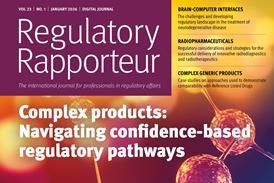Navigating orphan drug designation in the EU

Abstract
Orphan drug designation (ODD) in the EU is a regulatory mechanism designed to encourage the development of treatments for rare diseases, which often lack sufficient therapeutic options. Given the high costs and limited market potential of such treatments, the EU provides various incentives, including fee reductions and market exclusivity.
This article explores the legal framework of ODD, the eligibility criteria and the key considerations for sponsors seeking this designation. It also identifies some of the challenges associated with demonstrating significant benefits, obtaining reliable prevalence data and aligning with evolving regulatory requirements.
Strategic planning and early regulatory engagement are essential for sponsors to maximise these incentives and facilitate the development of innovative therapies for patients with rare diseases.
How to read this journal article
Thank you for visiting Regulatory Rapporteur. Journal articles are restricted to TOPRA members and registered users.
If you are a TOPRA member, or have already registered for limited free access, log in now (Option 1 below).
Not yet a member? You can either join TOPRA (Option 2 below) or register to view limited content for free (Option 3 below).



















